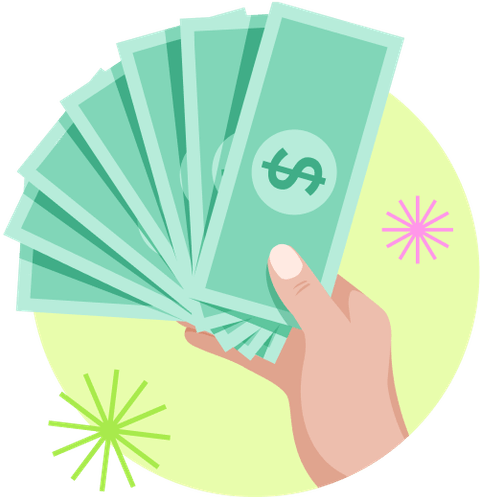How I Practice Financial Self-Care
Financial self-care can include daily bank account check-ins as well as long-term planning.

Many, or all, of the products featured on this page are from our advertising partners who compensate us when you take certain actions on our website or click to take an action on their website. However, this does not influence our evaluations. Our opinions are our own. Here is a list of our partners and here's how we make money.
When I recently interviewed financial experts on what it means to practice financial self-care, I ended each conversation by asking what their own favorite financial self-care practices were. I was curious to know if they applied an approach I hadn’t considered before.
Their answers did not disappoint. While some were more traditional, like building up an emergency fund, others were less typical, like signing up for health insurance rewards programs and taking themselves on money dates, where they set aside specific times to review financial tasks.
The creative ideas made me think about my own answer. I realized that for me, financial self-care includes some big-picture items — such as purchasing life and disability insurance plans — but perhaps more importantly, it’s about the smaller habits I rely on to stay on track financially.
Reviewing accounts daily
The most basic habit, which sounds simple but is something I consider to be crucial, is to check in on my credit card accounts and bank accounts every single day. It might seem silly, but taking the time to log in and make sure the money that I think should be there is still there gives me peace of mind. It also gives me a chance to notice if anything is amiss or if a bill hasn’t yet cleared.
I’ve actually noticed many errors this way. And I’ve experienced fraud or outright mistakes enough times to know that it happens somewhat frequently and the sooner you can shut it down, the more you limit potential damage.
Once, my child care center hadn’t charged me for months by accident, which meant I had to prepare for a mega-bill to hit at once. Another time, my son’s basketball league charged my credit card five times for one purchase. (They quickly reversed the charges once I pointed this mistake out to them.)
Daily check-ins also help me make informed spending decisions. When I spotted a credit card bill getting high because of summer camp costs, I delayed back-to-school purchases to avoid running up my monthly bill, for example. Another time, I noticed we had gotten dangerously close to our card’s credit limit after a home renovation expense, and I was able to make an early payment to avoid exceeding it.
Earn up to $350 in rewards each year
Take the next step with a NerdWallet+ membership. It's easy to rack up rewards for the smart financial decisions you're already making.

Aiming for intentional spending
I also consider frugal choices to be a form of self-care. Saving money gives me a little mood boost. For example, I take pleasure in making my own iced coffee at home instead of buying it at a coffee shop, where it could easily cost $5 or more a day. Of course, for some people, buying the iced coffee might be a form of self-care, and there’s nothing wrong with that choice, either.
Cooking meals at home and doing my own nails also helps me save money, and I happen to enjoy taking a DIY approach to those activities. That makes it feel more like self-care than self-denial.
One of the experts I interviewed called this process aligning your values with your spending. Lindsey Konchar, a financial therapist in Minnesota, explained that reflecting on your values before making purchases can be a powerful way to rein in spending. In fact, she suggests waiting 48 hours with the items in your cart to give yourself time to make that kind of thoughtful decision.
“It will guarantee you will put things in there and then not want them later,” she says.
At the same time, I try not to dwell on mistakes. If I end up spending more than I wanted to on takeout because I didn’t have time to prepare a meal, I just try to do a better job of planning next time.
Planning for long-term security
Estate planning, life insurance, disability insurance — these aren't fun topics. But they are important ones, and setting aside time to review your needs and any policy updates can provide a lot of reassurance. I challenged myself to cross these particular items off my to-do list this summer, and I know that it will feel great once I do so.
The bottom line? There’s no one-size-fits-all when it comes to financial self-care. We can all choose the practices that work best for us.
Article sources
NerdWallet writers are subject matter authorities who use primary,
trustworthy sources to inform their work, including peer-reviewed
studies, government websites, academic research and interviews with
industry experts. All content is fact-checked for accuracy, timeliness
and relevance. You can learn more about NerdWallet's high
standards for journalism by reading our
editorial guidelines.
Related articles







